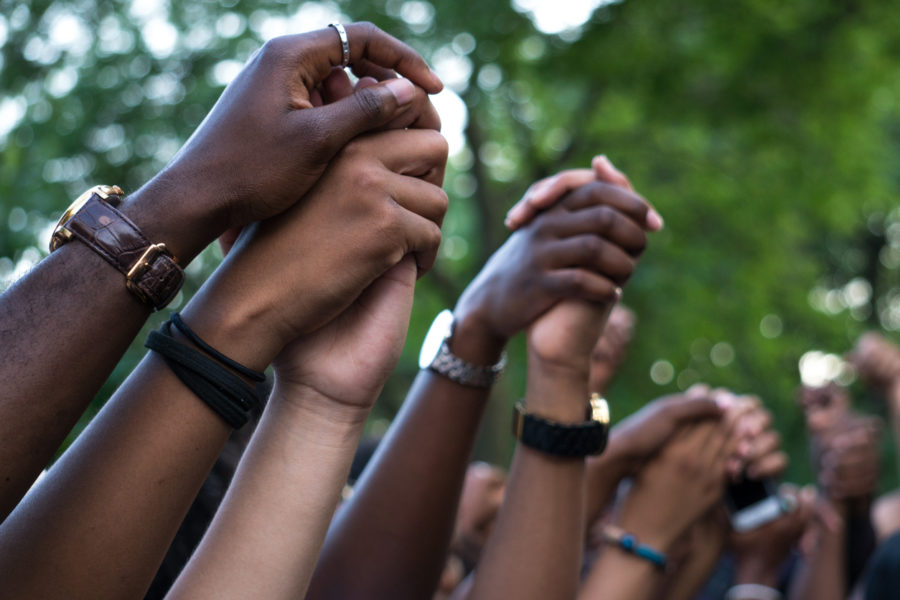Our Nation Needs Jesus — But Jesus Calls Us to Action
"Turning to Jesus" is not a passive activity.

Black Lives Matter protest in Montreal, Canada on July 13, 2016
When we look outside and see so much pain and turmoil, it’s hard to know how to respond.
We see pain and anger in the black community over centuries of dehumanization and discrimination. We see good police officers, sympathetic to protestors and rightly angered about the abhorrent killing of George Floyd, vilified or attacked by people intent on instigating more violence. We see people we love fighting, unfriending each other, or exposing things about themselves we wish we didn’t know.
It’s overwhelming.
Sometimes Christians, when we’re unsure of what to say, resort to generic platitudes about how much we need God.
Our nation must turn to Jesus, we write on social media. He’s the answer to all our problems!
Of course, nothing is truer. Jesus is the ultimate answer. Our nation desperately needs him. The danger in offering that statement, however, is that we may not be prepared to follow it to its conclusion.
“If Anyone Would Come After Me…”
“Turning to Jesus” is not a passive activity. Remember how Jesus told the rich young ruler to sell all his possessions, and then come follow him? Perhaps God isn’t calling us to sell everything we own. But he is calling us to wade into uncomfortable territory. To make sacrifices. To die to ourselves and do what he says. To quote Jesus in Mark 8, “If anyone would come after me, let him deny himself and take up his cross and follow me.”
The Bible has a lot to say about turning to God. It typically involves emphasis on changed behavior. That doesn’t mean our behavior must change before God accepts us into his family. What it does mean if that there is real inward change, there will be outward evidence.
“Each tree is known by its own fruit,” Jesus says in Luke 6. “The good person out of the good treasure of his heart produces good, and the evil person out of his evil treasure produces evil, for out of the abundance of the heart his mouth speaks.”
If there is real inward change, there will be outward evidence.
What about our platitudes, good thoughts, and religious posturing? God has no use for it.
“Your new moons and your appointed feasts my soul hates,” God says in Isaiah 1. “Even though you make many prayers, I will not listen; your hands are full of blood. … Cease to do evil, learn to do good; seek justice, correct oppression; bring justice to the fatherless, plead the widow’s cause.”
And in James 1, we’re reminded to “be doers of the word, and not hearers only, deceiving yourselves.” (Emphasis mine.)
Acknowledging that our nation needs God and that we all must turn to Jesus is not just a good starting point — it’s the only real starting point. But as Christians, we can’t stop there. We must ask ourselves: are we actually living out God’s Word in our current circumstances?
Not Still, Not Silent
Let’s examine the circumstances. George Floyd’s death at the hands of a Minneapolis police officer was the latest spark in what has become a national conversation about racism and injustice in our society. How can we make sure we’re living out God’s Word at this moment in time? Keeping in mind biblical themes of love for others, seeking justice and correcting oppression, here are three ways.
1. Engage and Listen
Maybe you haven’t experienced racism firsthand. Instead of denying the possibility that such hatred and ignorance could persist in America today, humble yourself. Listen to your brothers and sisters in Christ who claim otherwise. If there are people in your life you can reach out to personally, do so. Seek out authors, ministry leaders, and public figures whose experience may be different than your own. Two great places to start are this article by Christian hip-hop artist Shai Linne at The Gospel Coalition, and Be the Bridge, an organization dedicated to biblical racial reconciliation. We can’t be a unified body, sharing each other’s burdens and caring for each other properly, if we can’t even take the time to listen to and understand each other.
2. Confront Racism When You See It
Obviously we should stand up to overt racism. But it’s important to note that current generations understand “racism” as more than believing one’s own race is superior. Today, a joke, phrase, or action may be called “racist” if it perpetuates harmful stereotypes, or is insensitive to certain groups. Keeping others’ interests before our own, we should be willing to confront both types of racism when we see it, particularly in our own sphere of influence.
3. Pursue Change at Local, State, and Federal Levels
We can be thankful for the progress our nation has made toward racial equality, while acknowledging that problems persist. There are multiple proposed law and policy changes being discussed right now. Some sound extreme. Some are extreme. Some are things people across the political spectrum could get behind, if we really tried. So let’s engage in a productive discourse. Let’s identify problems and put in the work to achieve change where it’s needed.
In short, yes — our nation needs Jesus. But with him, we cannot be still or silent.
Liberty McArtor, former staff writer for The Stream, is a freelance writer in the great state of Texas, where she lives north of Dallas with her husband and son. Follow Liberty on Twitter @LibertyMcArtor, or learn more about her at LibertyMcArtor.com.







